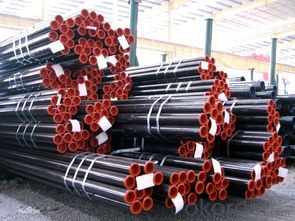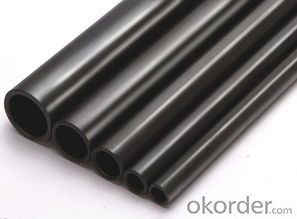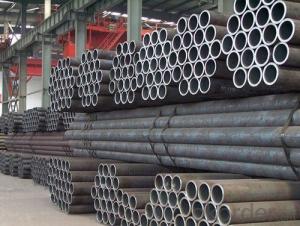API 5L GRAD B Seamless Carbon Steel Pipe
- Loading Port:
- Tianjin
- Payment Terms:
- TT OR LC
- Min Order Qty:
- 25 m.t.
- Supply Capability:
- 10000 m.t./month
OKorder Service Pledge
OKorder Financial Service
You Might Also Like
Product Description:
1、Structure of API 5L GRAD B Seamless Carbon Steel Pipe Description:
Seamless pipe is formed by drawing a solid billet over a piercing rod to create the hollow shell. As the manufacturing process does not include any welding, seamless pipes are perceived to be stronger and more reliable. Historically seamless pipe was regarded as withstanding pressure better than other types, and was often more easily available than welded pipe.
2、Main Features ofAPI 5L GRAD B Seamless Carbon Steel Pipe:
• High manufacturing accuracy
• High strength
• Small inertia resistance
• Strong heat dissipation ability
• Good visual effect
• Reasonable price
3、API 5L GRAD B Seamless Carbon Steel Pipe Images:


Packaging & Delivery
Packaging Details: | seaworthy package,bundles wrapped with strong steel strip |
Delivery Detail: | 15-30days after received 30%TT |
4、API 5L GRAD B Seamless Carbon Steel Pipe Specification:
Standard | GB, DIN, ASTM |
Grade | 10#-45#, 16Mn |
Thickness | 8 - 33 mm |
Section Shape | Round |
Outer Diameter | 133 - 219 mm |
Place of Origin | Shandong, China (Mainland) |
Secondary Or Not | Non-secondary |
Application | Hydraulic Pipe |
Technique | Cold Drawn |
Certification | API |
Surface Treatment | factory state or painted black |
Special Pipe | API Pipe |
Alloy Or Not | Non-alloy |
Length | 5-12M |
Outer Diameter | 21.3-610mm |
Grade | 20#, 45#, Q345, API J55, API K55, API L80, API N80, API P110, A53B |
Standard | ASME, ASTM |
1.Material:20#(ASTM A 106/A53 GRB.API5LGRB,GB),45#,16Mn,10#.
2.Specification range:OD:21.3-610mm,WT:6-70mm,length:6-12m or according to the requirement of clients.
3.Excutive standards:GB,ASME API5L.ASTM A 106/A53,Despite of the above standards,we can also supply seamless steel pipe with standard of DIN,JIS,and so on,and also develop new products according to the requirements of our clients!
4.Surface:black lacquered,varnish coating or galvanized.
5.Ends:Beveled or square cut,plastic capped,painted.
6.Packing:bundles wrapped with strong steel strip,seaworthy packing.
5、FAQ of API 5L GRAD B Seamless Carbon Steel Pipe:
①How is the quality of your products?
Our products are manufactured strictly according to national and internaional standard, and we take a test
on every pipe before delivered out. If you want see our quality certifications and all kinds of testing report, please just ask us for it.
Guaranteed: If products’ quality don’t accord to discription as we give or the promise before you place order, we promise 100% refund.
②How about price?
Yes, we are factory and be able to give you lowest price below market one, and we have a policy that “ for saving time and absolutely honest business attitude, we quote as lowest as possible for any customer, and discount can be given according to quantity”,if you like bargain and factory price is not low enough as you think, just don’t waste your time.Please trust the quotation we would give you, it is professional one.
③Why should you chose us?
Chose happens because of quality, then price, We can give you both.Additionally, we can also offer professional products inquiry, products knowledge train(for agents), smooth goods delivery, exellent customer solution proposals.Our service formula: good quality+good price+good service=customer’s trust
SGS test is available, customer inspection before shipping is welcome, third party inspection is no problem.
Any question, pls feel free to contact us !
- Q:Can steel pipes be galvanized?
- Yes, steel pipes can be galvanized.
- Q:What is the difference between steel pipes and cast iron soil pipes?
- Steel pipes and cast iron soil pipes differ in their composition and characteristics. Steel pipes are made of an alloy of iron and carbon, providing them with high strength and durability. They are commonly used for transporting fluids and gases, and are resistant to corrosion. On the other hand, cast iron soil pipes are made from molten iron that is poured into molds. They are primarily used for drainage and sewage systems due to their excellent soundproofing properties. Cast iron soil pipes are more resistant to fire and have a longer lifespan compared to steel pipes. Additionally, cast iron soil pipes are typically heavier and thicker than steel pipes, making them more suitable for underground installations. However, steel pipes are lighter and easier to handle, making them a preferred choice for above-ground applications. Ultimately, the choice between steel pipes and cast iron soil pipes depends on the specific requirements of the project, such as the intended use, location, and budget.
- Q:Can steel pipes be used for underground culverts?
- Yes, steel pipes can be used for underground culverts. Steel pipes are known for their strength, durability, and resistance to various environmental factors, which makes them suitable for underground applications. They can withstand heavy loads, high water pressure, and the corrosive effects of soil and water. Additionally, steel pipes are available in various sizes and thicknesses, allowing for customization to fit specific project requirements. However, it is important to consider factors such as the soil conditions, water table levels, and potential for corrosion when selecting the appropriate type of steel and protective coatings for the pipes.
- Q:How are steel pipes insulated for thermal applications?
- Steel pipes are commonly insulated for thermal applications using various materials such as fiberglass, mineral wool, or foam insulation. These insulating materials are typically wrapped around the steel pipes to create a protective barrier that reduces heat transfer. Additionally, a vapor barrier may be installed to prevent moisture condensation. This insulation helps to maintain the desired temperature of the fluid or gas being transported through the pipes and prevents energy loss.
- Q:Are steel pipes suitable for potable water applications?
- Yes, steel pipes are suitable for potable water applications. Steel pipes are commonly used for transporting water in various industries and municipal water systems. They are known for their durability, strength, and resistance to corrosion, making them a reliable choice for potable water systems. Steel pipes also have the advantage of being able to withstand high pressure and temperature conditions, making them suitable for both hot and cold water applications. Additionally, steel pipes can be easily welded, ensuring leak-free connections. However, it is important to note that the quality of the steel used and proper maintenance are crucial factors in ensuring the safety and suitability of steel pipes for potable water applications. Regular inspection and maintenance should be done to prevent corrosion and ensure the integrity of the pipes.
- Q:Are steel pipes suitable for oil and petroleum applications?
- Due to their exceptional strength, durability, and resistance to corrosion, steel pipes find extensive use in oil and petroleum applications. With the ability to endure high pressure and extreme temperatures, these pipes are ideal for the long-distance transportation of oil and petroleum. Moreover, steel pipes possess the added advantage of being able to withstand impact and vibrations, both prevalent in the oil and petroleum industry. Furthermore, their ease of welding and connecting facilitates efficient and cost-effective installation. In summary, steel pipes are the favored option for oil and petroleum applications, guaranteeing the secure and efficient conveyance of these valuable resources.
- Q:What are the different types of valves used with steel pipes?
- There are several types of valves used with steel pipes, including ball valves, gate valves, globe valves, check valves, and butterfly valves.
- Q:Can steel pipes be used for oil drilling operations?
- Yes, steel pipes are commonly used for oil drilling operations. They possess the necessary strength and durability to withstand the harsh conditions of drilling and transporting oil. Additionally, steel pipes have excellent corrosion resistance, making them suitable for long-term use in the oil and gas industry.
- Q:How are steel pipes classified according to their wall thickness?
- Steel pipes are classified according to their wall thickness into three categories: schedule, standard, and extra strong.
- Q:How are steel pipes used in agriculture?
- Steel pipes are widely used in agriculture for various purposes. One common application is irrigation systems. Steel pipes can be used to transport water from a water source, such as a well or a reservoir, to different areas of a farm. These pipes are durable and can withstand the pressure of water, making them ideal for long-distance water transportation. Additionally, steel pipes are also used for drainage systems in agriculture. They can be used to remove excess water from fields, preventing waterlogging and ensuring proper drainage. Steel pipes are resistant to corrosion, which is important in agricultural settings where they may be exposed to moisture and various chemicals. Moreover, steel pipes are used in the construction of greenhouse structures. They provide structural support for the greenhouse framework and allow for the installation of irrigation systems and other equipment. Steel pipes are strong, sturdy, and can withstand harsh weather conditions, making them suitable for greenhouse construction. Furthermore, steel pipes are utilized in livestock farming. They are commonly used to create fences and enclosures for animals, providing a secure and durable barrier. Steel pipes are also used in the construction of animal shelters and barns. In summary, steel pipes play a crucial role in agriculture. They are used for irrigation systems, drainage systems, greenhouse construction, and livestock farming. Their durability, strength, and resistance to corrosion make them an excellent choice for various agricultural applications.
1. Manufacturer Overview |
|
|---|---|
| Location | |
| Year Established | |
| Annual Output Value | |
| Main Markets | |
| Company Certifications | |
2. Manufacturer Certificates |
|
|---|---|
| a) Certification Name | |
| Range | |
| Reference | |
| Validity Period | |
3. Manufacturer Capability |
|
|---|---|
| a)Trade Capacity | |
| Nearest Port | |
| Export Percentage | |
| No.of Employees in Trade Department | |
| Language Spoken: | |
| b)Factory Information | |
| Factory Size: | |
| No. of Production Lines | |
| Contract Manufacturing | |
| Product Price Range | |
Send your message to us
API 5L GRAD B Seamless Carbon Steel Pipe
- Loading Port:
- Tianjin
- Payment Terms:
- TT OR LC
- Min Order Qty:
- 25 m.t.
- Supply Capability:
- 10000 m.t./month
OKorder Service Pledge
OKorder Financial Service
Similar products
New products
Hot products
Related keywords





























